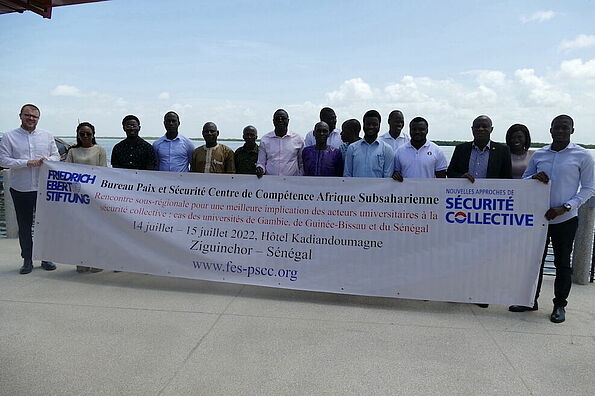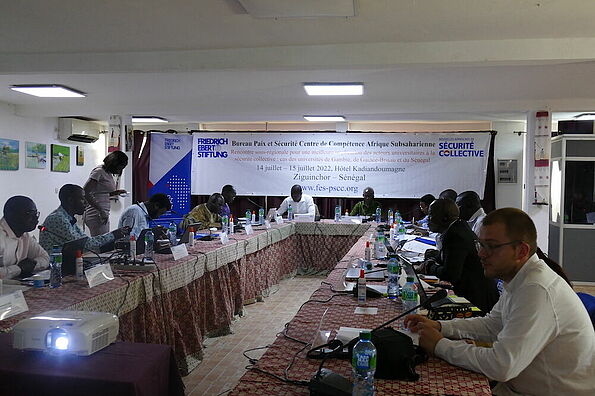Sub-regional meeting for a better involvement of university actors in collective security : the case of the universities of Gambia, Guinea-Bissau and Senegal
The Gambia, Guinea-Bissau and Senegal are linked by history, by people and by their borders. This closeness has led to the expression 'brotherly peoples' being coined. Thus, if we examine the relations between these three countries from a geographical and security point of view, we quickly realise that, independently of the natural region of Casamance where a conflict has been raging for nearly 35 years, various security issues and threats exist and interact. These include drug trafficking, cross-border crime, the proliferation of small arms, a criminalised economy, political instability, etc. In fact, there is growing insecurity in the cross-border areas that must be identified and controlled to prevent the installation of chronic instability that would destabilise these three border countries.
Even if the facts show that these three countries have not yet experienced open conflicts linked to violent extremism or radicalism, the fact remains that they are still at risk because of the porous nature of their borders, but above all because of the cases of extreme violence between cross-border communities, trafficking in human beings, arms, wood and drugs, and cattle rustling. Indeed, at the social level, there is a proximity between the communities which constitutes a sort of "communicating vessel", so that when one of the countries experiences a conflict or crisis, its neighbours feel it and experience it too. The sub-regional and transnational dimension that these security threats tend to take on makes cooperation between the three states in the area necessary and unavoidable in order to deal with them. These multidimensional forms of insecurity require new approaches based on the involvement and collaboration of all actors, including those from the academic world.
It is in this sense that the Peace and Security Competence Centre of the Friedrich Ebert Stiftung has organised this conference to reflect on the role and involvement of the academic world in the search for solutions to the security challenges common to Senegal, The Gambia and Guinea-Bissau.
The conference included a number of panels on a variety of complementary topics :
- Panel 1 : Overview and synoptic table of security challenges common to The Gambia, Guinea Bissau and Senegal.
- Panel 2 : Role and contribution of academic actors to collective security in the sub-region: Gambia, Guinea Bissau, Senegal
- Panel 3 : How to involve the academic world in the search for sustainable solutions to cross-border security challenges : the case of The Gambia, Guinea-Bissau and Senegal
- Panel 4 : Identification of avenues of collaboration between researchers from the universities of The Gambia, Guinea-Bissau and Senegal on security issues
The exchanges and discussions brought out several observations. Among other things, the most unanimous observation made by the academics was that the communities living in the border areas do not always take into account the border limits. The same communities and families live on both sides of the same border. This ease of movement of people in these three countries (Gambia, Guinea-Bissau, Senegal) is evidence of the porous nature of the borders and contributes to the ease of movement of armed groups from one country to another and to the establishment of rear bases there. The possibility of moving so easily across a border is a real asset and an ideal breeding ground for the development of insecurity and cross-border crime. Secondly, it was noted that there is little cooperation between the universities of the South and that the security issue has been left to the defence and security forces alone.
In view of these observations, many recommendations were proposed, including the following :
In the short term :
- Develop South-South cooperation between the universities of the three countries through exchanges of professors, twinning to share experiences ;
- Create Masters and specialised certifications on security issues to interest more students on such issues to make them specialists in the future ;
- Organise this sub-regional meeting annually by integrating the universities of Guinea-Conakry and Mauritania;
- Organise forums to sensitise the population on the need to get involved in the endogenous search for solutions to the security challenges affecting the various countries ;
- Demilitarise and democratise security issues and not leave it exclusively to the defence and security forces.
In the long term :
- Set up an institute, think tank or research centre bringing together academics from Senegal, The Gambia and Guinea-Bissau to reflect and advise policy makers on the most appropriate solutions to the security challenges facing the different countries.
Friedrich-Ebert-Stiftung
Paix et Sécurité Centre de Compétence Afrique Subsaharienne
Villa Ebert
Avenue des Ambassadeurs
Fann Résidence
25516 Dakar-Fann
Sénégal

